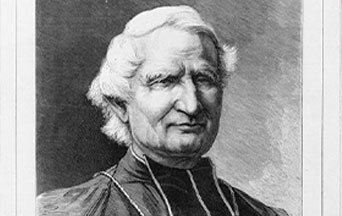
As the time for a decision on Papal Infallibility drew near, two sides formed amongst the Fathers who gathered for the First Vatican Council. Henry Cardinal Manning of Westminster led the majority—those in favor of the definition. The leader of the anti-infallibilist minority was Bishop Felix Dupanloup of Orléans in France. The majority sent the pope an urgent request to discuss infallibility while the minority requested postponement. The majority’s postulatum had close to 480 signatures; the opposition claiming the definition was “inopportune” and therefore urging delay only garnered 137 supporters.
The diplomatic agitation around the issue had been intense since the beginning of the Council. It peaked, but could not shake Pius IX’s resolve. The pontiff saw no reason to postpone the study of infallibility, especially since few of the roughly 800 Council Fathers opposed it.
Eternal and Natural Law: The Foundation of Morals and Law
The entire opposition centered its attack on “untimeliness.” They did not argue against infallibility itself, but only that the time was not right. This question caused the same stir among Catholics worldwide, demonstrating the urgent need for a Council pronouncement. Giacomo Cardinal Antonelli, the Vatican Secretary of State, explained to Pius IX the mindset of the governments of great European powers. Further, he elaborated the consequences that the definition of infallibility might have. Pius IX replied: “The Blessed Virgin is with me, and I shall go ahead.”
On April 23, 1870, in a desperate last-ditch attempt to get the question postponed, Bishop Dupanloup wrote the letter transcribed below. The Bishop of Orléans hoped to make a decisive argument. That might have succeeded had Pius IX still been unconvinced about the need for the proclamation. However, lacking arguments, the Bishop of Orléans tried to frighten the Holy See. Bishop Dupanloup predicted schisms and persecutions. In the process, he completely ignored the pontiff’s spirit of faith. The pope was determined to do anything to fulfill his duty. Only the minority’s desperation can explain why a skillful writer such as the Bishop wrote such a disrespectful and even threatening letter.
“Most Holy Father,
“My name is not pleasant to you; I know it, and it pains me. However, I do not feel any less authorized and obliged to open my heart to Your Holiness now with the deep and inviolable devotion of which I have already given you many proofs.
“The rumors have been confirmed that several [Fathers] are asking Your Holiness to order our most crucial work immediately suspended and reverse the order of discussions to bring the question of infallibility to the Council suddenly, abruptly, prematurely, and out of place.
“Permit me, Most Holy Father, to tell Your Holiness that nothing could be more dangerous. This question is setting Europe on fire; competent men attest to this fact with one voice. This fire will spread if, with violent precipitation, one gives the impression of wanting to take the issue by storm at any price and even anticipate the hour of Providence by changing the natural order of things. I think I would betray the Holy See and the Church if, knowing all that I foresee, I failed to warn Your Holiness with respect but entire sincerity while there is still time to spare the Church and the Holy See misfortunes in all Christendom. They may turn into disasters that will last for long years, causing the loss of an incalculable number of souls.
Learn All About the Prophecies of Our Lady of Good Success About Our Times
“Most Holy Father, it is impossible to say everything in a simple letter. It would require a volume. Your Holiness certainly wishes to be enlightened. There is a much simpler way. Call, from each nation, the most experienced and disinterested bishops unafraid of telling the truth. Ask them to speak the whole truth; give them all the time necessary to explain themselves, informing all they know about people’s dispositions in their countries and all that such an ostentatious precipitation would add to the dangers of the present hour.
“That is the only means of truly enlightening the Holy Father and relieving his conscience. Facts cannot be guessed; one cannot know them except through careful and thorough information. To act without being fully instructed in a matter so grave and fraught with the most formidable and irrevocable consequences would be to tempt God by plunging into the unknown and assuming the most terrible of responsibilities not only before men but also before God.
“Most Holy Father, forgive one of your oldest and most faithful servants for the episcopal and filial liberty he takes by writing this letter. After the love of the Church and souls, he is driven only by the sole and purest desire to serve Your Holiness again, perhaps avoiding the greatest pain that can strike a saintly pope’s heart in his final days: seeing the Church on fire and her bosom torn apart by new schisms.
”Most Holy Father, prostrate at your feet with the most profound and persevering devotion and religious obedience, I remain Your Holiness’s most humble son and servant.

